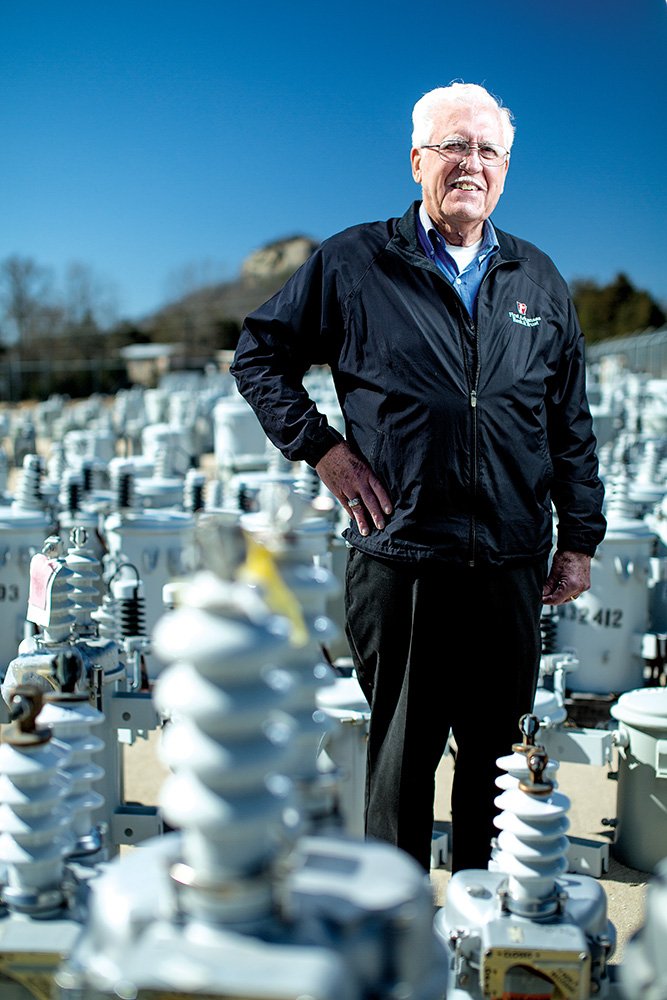HEBER SPRINGS — Wetzel Stark has served his community for most of his life. Now 83, he has retired from more jobs and board memberships than many people could ever dream of holding.
Stark, who has been a business owner, a county clerk and a member of the city council, has served on the school board and the quorum court, as well as on numerous boards of trustees in Cleburne County.
Earlier this month, he retired from First Electric Cooperative’s Operation Round-Up Board of Trustees. He has represented members in the Heber Springs district since the nonprofit began participating in Operation Round-Up in 1998.
Under this program, funds are raised from donations of members who choose to have their electric bills “rounded up” to the next even dollar amount each month. Those donations, in turn, are given to area nonprofit organizations and as scholarships for graduating high school seniors.
“We have helped many people in our area in the past 15 years,” Stark said. “We’ve helped nonprofit organizations such as [Margie’s] Haven House (a women’s shelter), Cleburne County Cares, Cleburne County Historical Society, Christian Health Center, Cleburne County Single Parent Scholarship Fund, Care Caps and the rural fire departments. We always help the fire departments; no questions asked.
“We also give scholarships to deserving high school seniors.”
He added that it has been a policy “over the years that we do not give any funds to churches, municipalities, government or political organizations.”
“Some requests are turned down,” he said. “And nonprofit organizations can apply for funding only once a year.”
He said there is also a disaster fund that has been used only “one or two times, in cases of natural disasters such as tornadoes.”
Stark said First Electric Cooperative has “about 10 percent of its membership” that subscribes to Operation Round-Up. “We collect about $15,000 a quarter, statewide,” he said. “I always think, ‘What would happen if 50 percent of our people would just pay that little bit extra? What could we do?’
“Every penny collected goes back into the community,” Stark said. “All costs are paid by First Electric.
“Of all the boards I have served on, I am most proud of the work we have done on Operation Round-Up. I always came away from the meetings with a good feeling. I hope more people will join. It’s amazing what a few pennies can do.”
Tori Moss, communications coordinator for First Electric Cooperative, said First Electric serves more than 88,000 member accounts throughout 17 counties in central and southeast Arkansas. The cooperative is headquartered in Jacksonville and maintains full-service offices in Heber Springs, Benton, Perryville and Stuttgart.
Moss said the Operation Round-Up Board of Trustees approved $12,500 in donations in December 2013 to 15 nonprofit organizations throughout the areas it serves.
Organizations in the Three Rivers Edition coverage area receiving donations in December include, in Cleburne County, Christian Health Center, $1,000; in Independence County, Child Care Aware of Northcentral Arkansas, $1,000; in Cabot, the Cabot Christmas Alliance, $1,000; and in Jacksonville, Fishnet Missions of Jacksonville, $1,000, and the Little Rock Air Force Base Historical Foundation, $500.
Stark was born and raised near Quitman in Cleburne County. In fact, he still lives on the old homeplace.
He attended Pearson School until he was in the eighth grade, then transferred to Quitman High School.
“I didn’t graduate,” he said. “My father died when I was 16, and I had to drop out to take care of the farm. Everybody farmed in those days.”
Stark served his country during the Korean War as a member of the 82nd Airborne Division, stationed at Fort Bragg, N.C. He saw no combat.
“I expected to,” he said, “but they kept me here.”
He earned a high school equivalency diploma through correspondence courses with the American School (of Correspondence) in Chicago and with courses he took when he was in the Army.
After he was discharged from the Army, he returned home and married his wife, Dorothy; they will celebrate their 61st wedding anniversary this year. They have one son, Phillip, who lives in Heber Springs; seven grandchildren; and nine great-grandchildren.
The Starks owned and operated a grocery store on the square in Heber Springs for 27 years, from 1955 to 1982.
“That was during the beginning of Greers Ferry Dam. That was a good time to start a business. We had a profitable business for a good many years,” he said.
“I was retired for approximately one month when the office of county/circuit clerk came open,” he said, noting that it was a combined office at that time. “I served for 12 years.”
He said that in 1992, he asked the court to separate the offices, and he took the county clerk position. He retired from that office in 1995.
In the ensuing years, Stark would serve as a member of the Cleburne County Quorum Court, the Heber Springs School Board and the Heber Springs City Council, as well as several boards of trustees.
“I remain on one board of trustees — the Pearson Cemetery Board,” he said with a laugh. “At my age, that’s a good one to be on.
“I still go to Rotary, and I’m still active in my church, First General Baptist Church in Heber Springs. I don’t want to sit down and do nothing. But it’s good to be away from the obligations of some of these boards. I need to step down and let a young person take it on. You get to a point where you are thinking more about the past than the future, and that’s not good. You need younger people to carry on the work.”
